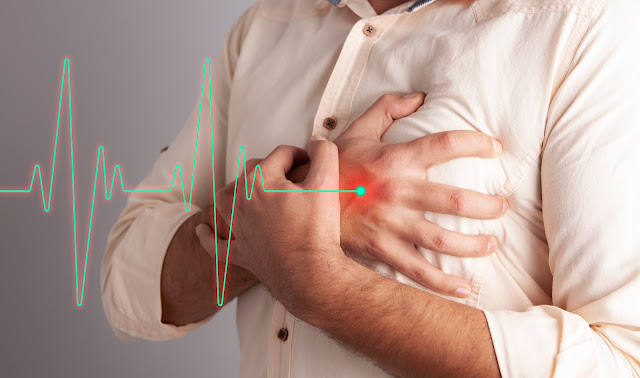A doctor's first priority when treating heart palpitations
is to rule out underlying conditions. Many people are at high risk for
palpitations after having a heart attack, so a doctor will take a detailed
medical history and perform a physical exam. He will check vital signs and
listen to the heart through a stethoscope. He may ask you to tap out the rhythm
of your palpitations to determine what is causing them.
Beta-Blockers
Beta-blockers are a class of heart medications that can be
taken to control heart palpitations and other heart rhythm disorders. However,
beta-blockers do not work for all patients, and they should be prescribed only
if necessary. These medications are used in a variety of situations, from heart
palpitations to cardiac arrest.
Lifestyle Changes
If you are experiencing palpitations, you need to change
your lifestyle. Your diet plays an important role in heart health. Keep a food
diary and note what causes palpitations. Also, avoid eating foods that contain
tyramine. Stay away from caffeine and other stimulants. You should also avoid
common cold unani
medicine for heart with phenylephrine, which can make
palpitations worse. If none of these tips work, see your doctor to determine
what is causing your symptoms.
Smoking, caffeine, and alcohol are known triggers of heart
palpitations. Avoiding these sources of caffeine and alcohol is a good place to
start. If you have a family history of heart problems, avoiding these
substances can be helpful. If you are experiencing palpitations frequently, you
can also try to reduce the amount of stress in your life. You should also avoid
illegal drugs, such as cocaine and amphetamines.
Valsalva Maneuver
If your heart beats too fast and you have trouble
controlling it, you may want to try the Valsalva maneuver. This technique slows
down your heartbeat and can help prevent or stop tachycardia. However, it is
important to note that you should not perform this maneuver without medical
supervision.
This maneuver is a simple technique that involves tightening
the chest and stomach muscles. Then, you forcefully breathe out while holding
this position for 10 seconds. Alternatively, you can blow into a syringe filled
with air for 15 seconds. This creates a pressure called intrapleural pressure.
This increased pressure stimulates the heart's baroreceptors, which detect an
increased blood pressure.
The Valsalva maneuver can be very helpful in the diagnosis of
heart disease. In patients with narrow-complex tachycardia, it can be used to
help regulate heart rate. It involves holding the breath, tightening abdominal
muscles, and suddenly releasing it. It can help reduce the heart rate and break
a SVT, which may cause a syncopal episode.
Identifying Triggers
Heart palpitations are often caused by a heart rhythm
condition called arrhythmia. These are short-circuits in the electrical system
of the heart that cause the heart to beat abnormally. This can lead to palpitations,
shortness of breath, dizziness, and chest pain. However, these heart rhythm
problems are not life-threatening.
Palpitations can be caused by a variety of factors,
including stressful situations and dietary factors. In addition to lifestyle
factors, a patient's past medical history can help identify the triggers of
palpitations. In some cases, a family history of palpitations may be a clue.
Lifestyle changes can also be effective in reducing the
frequency of palpitations. Some people experience palpitations when they are
stressed or going through a panic attack. Hormonal changes in the body can also
trigger heart palpitations. Some people may experience them during pregnancy or
just before menopause. Others may experience palpitations after eating heavy
meals or certain foods. In such cases, keeping a food diary can help identify
triggers and prevent the occurrence of heart palpitations.
Traditional Chinese Medicine
Heart palpitations are a common symptom and can be triggered
by a variety of things, including anxiety and fear. While they are not life
threatening, heart palpitations can be a sign of other heart problems,
including coronary heart disease, hyperthyroidism, asthma and other serious
conditions. Fortunately, there is a treatment for heart palpitations
that can help alleviate your symptoms. Chinese herbal medicine and acupuncture
have been used for centuries to help treat heart palpitations.
The first step in Traditional Chinese Medicine treatment for
heart palpitations is to determine the cause. There are several patterns of
disharmony related to heart palpitations, and TCM practitioners use a
diagnostic system to determine the cause of heart palpitations. Some of these
patterns identify a weak yin or yang component in the heart, while others
pinpoint the involvement of the gall bladder or phlegm.

